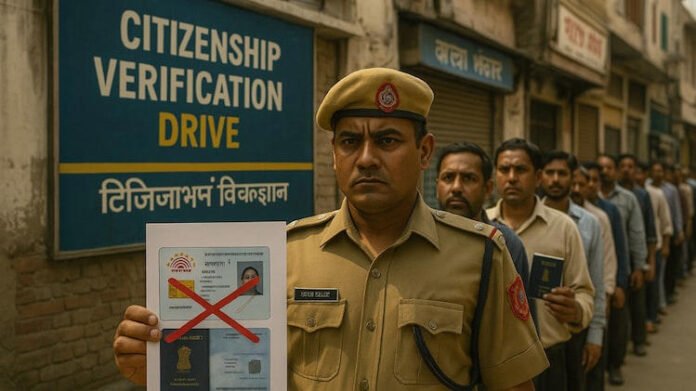The Delhi Police has issued a fresh directive declaring that Aadhaar and PAN cards will no longer be accepted as valid identity proofs for foreign nationals living illegally in the country. This comes in the aftermath of a high-profile crackdown in Pahalgam, Jammu and Kashmir, where dozens of Rohingya immigrants were found using forged Indian identity documents.
The directive aims to close the loopholes that have allowed illegal immigrants—especially Rohingyas and Bangladeshis—to obtain Indian documents and reside undetected across Indian cities. With national security and demographic integrity in mind, the Delhi Police’s move is part of a larger, coordinated effort to crack down on foreign nationals residing without valid documentation.
Read More: Assam University Stages Protest, Mourns Victims of Pahalgam Terror Attack
Background: Pahalgam Operation Sparks Nationwide Action
The directive comes just weeks after security agencies uncovered a nexus in Pahalgam involving Rohingya immigrants who had not only crossed into India illegally but had also obtained Indian identity proofs like Aadhaar, PAN, and voter cards. Several arrests were made, and the racket exposed a deeper problem of document fraud, allegedly facilitated by local agents in exchange for money.
The Pahalgam incident sent shockwaves through the intelligence community, prompting Delhi Police and other state authorities to reassess the status of immigrants in their jurisdictions. In response, the Delhi Police Commissioner has now mandated stricter verification protocols and directed all units to disregard Aadhaar and PAN as valid proof of nationality during foreigner verification drives.
Delhi Police’s New Guidelines
According to the new directive:
- Aadhaar and PAN cards are to be considered insufficient as proof of Indian nationality.
- Foreign nationals must produce legitimate passports, visas, or other documents issued by their country of origin.
- Tenants, employers, and landlords have been warned against renting property or offering jobs to undocumented immigrants.
- Action under the Foreigners Act and Passport Act will be initiated against violators.
This move is seen as a significant tightening of immigration control measures in the national capital, which is home to a growing population of undocumented migrants.
Why Aadhaar and PAN Are Being Rejected
While Aadhaar and PAN are crucial to Indian citizens for accessing government services and financial systems, they do not verify citizenship status. These documents are meant to establish identity and tax compliance, not nationality. This loophole has been widely exploited by illegal immigrants, some of whom managed to get enrolled with fake or manipulated data, often with help from corrupt intermediaries.
The government and law enforcement agencies have now realized that relying on Aadhaar or PAN for nationality verification has compromised the country’s security apparatus. The latest directive attempts to correct this oversight by putting stricter controls in place.
Impact on Rohingya and Bangladeshi Immigrants
The primary focus of the crackdown appears to be Rohingya Muslims and Bangladeshi nationals, many of whom are believed to have entered India illegally over the years. These groups have settled in parts of Delhi, Jammu, Uttar Pradesh, and West Bengal, often working in the informal sector.
Human rights groups have raised concerns about the humanitarian aspects of these actions, but the government maintains that national security and legal immigration protocols must be prioritized.
Political and Public Reactions
The move has been welcomed by several political parties, especially those who have long raised concerns over illegal infiltration and demographic imbalance. The BJP has lauded the Delhi Police’s initiative, calling it necessary for restoring legal order and protecting national interests.
On social media, many users expressed support for the directive, citing concerns about employment, housing, and resource strain due to unchecked immigration.
The Delhi Police’s directive to disregard Aadhaar and PAN as valid ID for illegal immigrants signals a tougher stance on unauthorized immigration. Following the alarming discoveries in Pahalgam, authorities are intensifying efforts to identify and deport illegal immigrants, closing loopholes that previously allowed misuse of Indian documents.
As India strengthens its internal security framework, stricter enforcement of citizenship verification is likely to become a national trend, reshaping how identity and legality are determined in urban centers.

